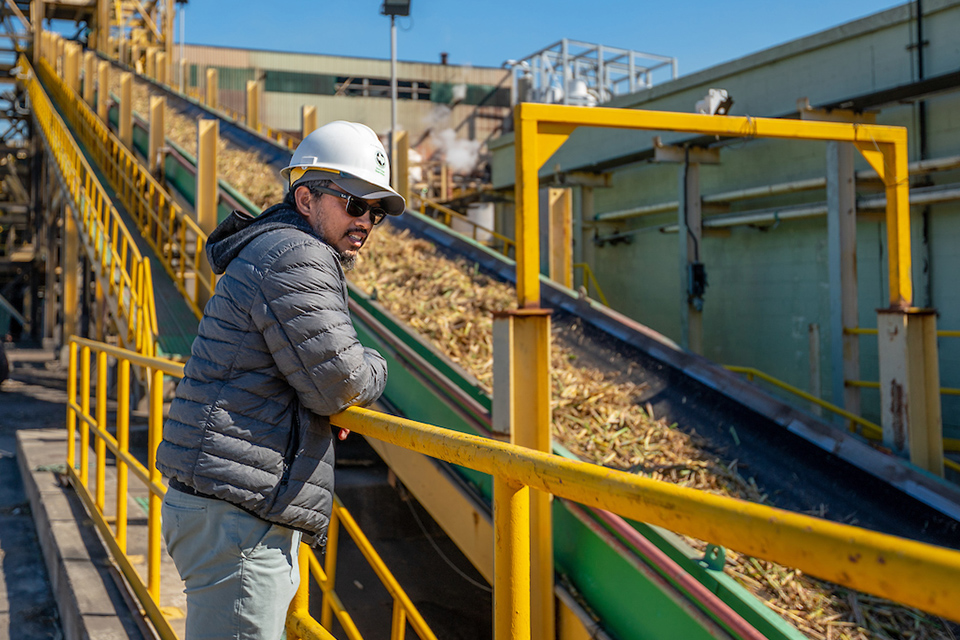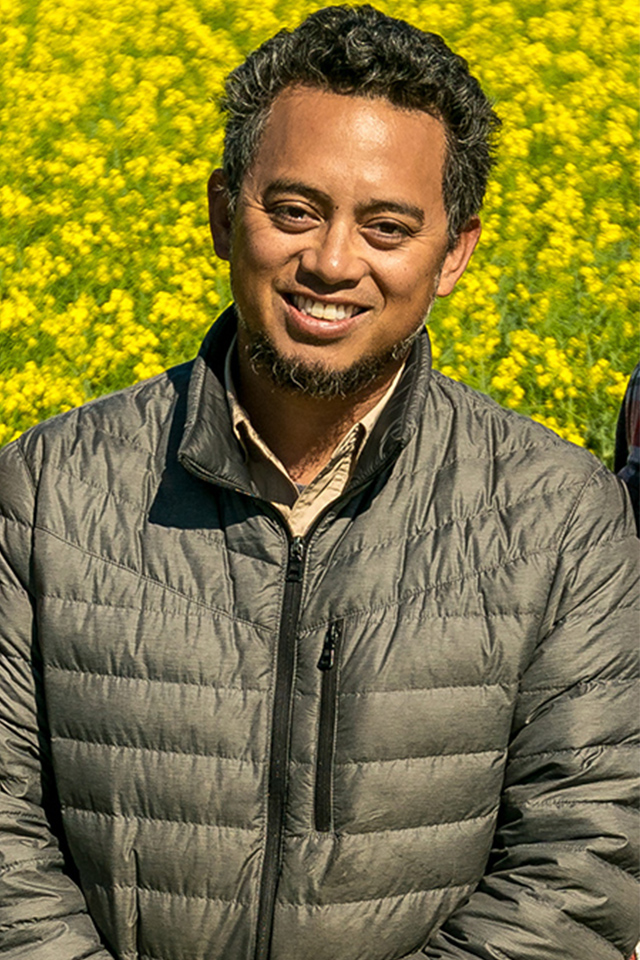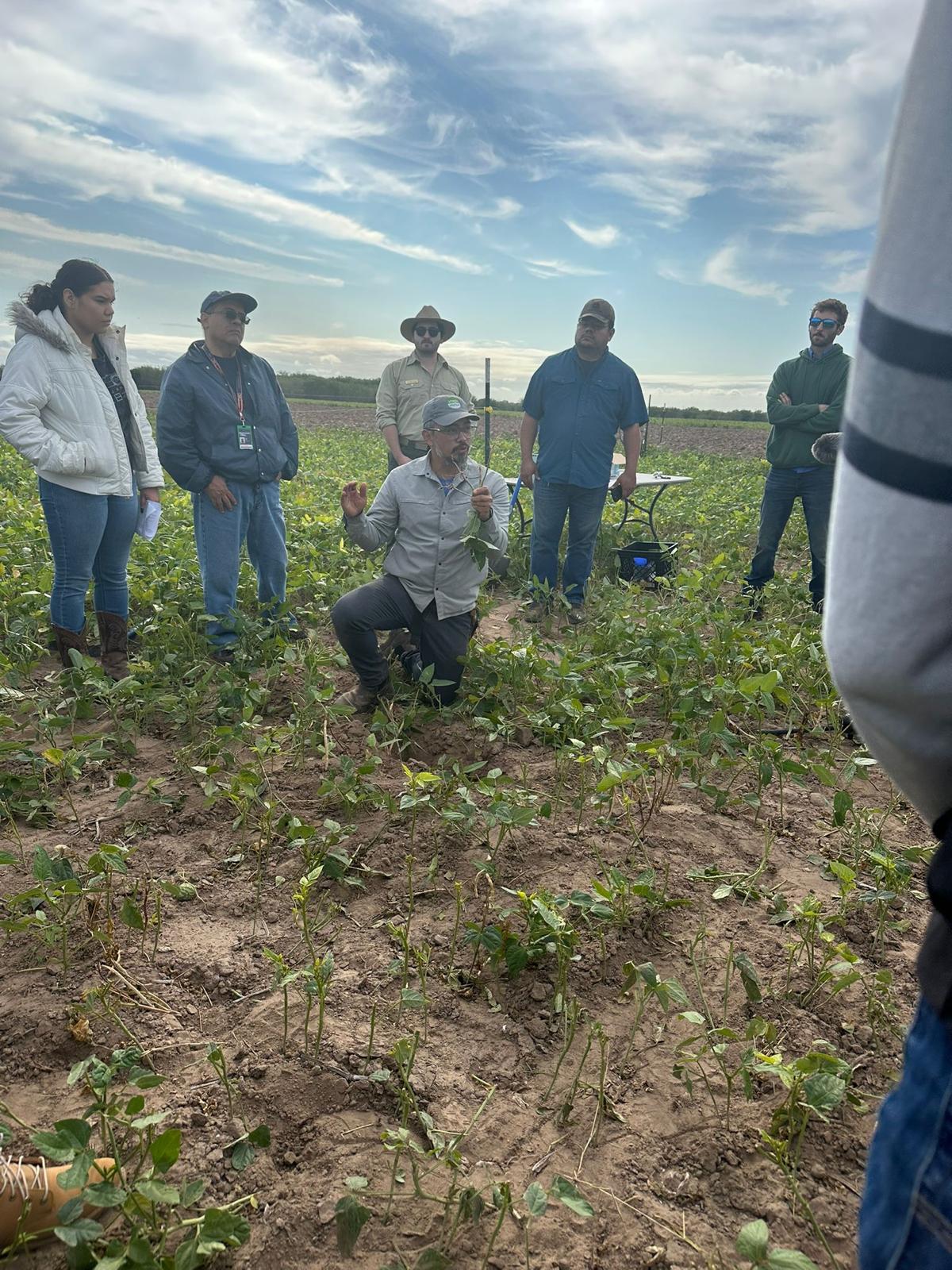By Karen Villarreal
RIO GRANDE VALLEY, TEXAS – DEC. 18, 2024 – The Rio Grande Valley, one of the fastest growing regions of the U.S., is home to a rural leader whose philosophy of informed, collaborative action and sustainable growth has gained national recognition.
Dr. Alexis Racelis, director of UTRGV’s Agroecology and Resilient Food Systems program, was selected as one of 14 Rural Innovators by the White House’s Domestic Policy Council. On Wednesday, senior Biden-Harris Administration officials recognized Racelis and other rural community leaders during an event at the White House.
The White House recognized Racelis’s Agroecology and Resilient Food Systems program at UTRGV as “innovative for concurrently addressing issues in food, agriculture, and agricultural education through applied research, experiential learning and community engagement.”
Racelis, who was appointed in 2022 to the USDA Equity Commission’s Subcommittee for Agriculture, said he’s proud that his strategic plan, which integrates applied professional scholarship and research, has helped advance rural economies and societies in mutually beneficial ways.
“A lot of the research I do is to help inform action. We have to move quickly,” said Racelis, a professor in the School of Earth, Environmental, and Marine Sciences (SEEMS). “For a lot of our communities, it's urgent.”
A SUSTAINABILITY STUDENT PIPELINE
Racelis said the bachelor’s degree in Sustainable Agriculture and Food Systems and the graduate degree in Agricultural, Environmental and Sustainability Sciences are an important element of his approach to advancing sustainable food systems, as they channel sustainability-minded students into environmentally-focused careers.
Over the last decade, Racelis has trained 40 graduate students and countless undergraduates, instilling both technical abilities and a service-minded philosophy. Many graduates have gone on to enact sustainable changes in careers within education, government, nonprofits and community organizations.
Numerous alumni, like Carlos Andres Garcia Patlan, who is now a regional community ecologist with the Texas A&M Forest Service, continue to work closely with Racelis on a tree-planting projects aimed at combating extreme urban heat.
Another former student, Jorge Cantu, now a professor at South Texas College, co-wrote a $1 million grant with Racelis to support students interested in sustainable agriculture in the Rio Grande Valley.
Jose Escamilla, Rocio Hernandez and Habraham Lopez, all graduates of the Agroecology Program, are now leading agriculture and conservation initiatives in local schools and are deeply involved in developing farm-to-school programs.
Similarly, Racelis and associate professor of practice Tim Sears founded the Agroecology Professional Development Institute to incorporate more sustainability opportunities in high schools’ curricula.
With a network of more than 160 teacher-alumni, they have created courses and programs that have secured grants for their schools throughout the Rio Grande Valley. These alumni are now guiding their own students to food, agriculture and natural resources related studies.
“With all these partners in place, we can continue to work together to take strategic, informed action to advance our communities in ways we all prosper,” Racelis said.
NATURE AND SERVICE
Currently, Racelis advises or co-advises seven graduate students and oversees nine undergraduate students in his lab, along with four full-time employees working on various projects on and off campus.
He has led the students on numerous sustainability initiatives focusing on educating the public, transforming local food systems, mitigating urban heat through increased tree coverage, preserving native plants and stable soils, and securing funding rural areas in Texas.
As a UTRGV professor, Racelis feels privileged to express who he is through work he considers his calling.
“It combines my passions – appreciating nature and being of service,” he said.
This commitment goes back to his childhood.
“My grandfather taught me a lot about self-sustenance, and growing food in our own backyard and understanding that there are things that we can do for our own viability, resilience, and livelihood,” he said.
By observing how his family helped each other at home and the broader community, Racelis learned collaboration and engagement is essential to the advancement of society.
JUSTICE-CENTERED, APPLIED RESEARCH
As his career evolved, Racelis’s philosophy of putting science to service became part of his leadership style and projects, from starting school and community gardens to partnerships with functioning farms to research soil and water conservation, as well as reducing the dependency on pesticides and synthetic fertilizers through organic methods.
“Of course, we publish the work and disseminate our science, but as someone once said: information without action is futile – and action without information is often fatal,” he emphasized. “I actually have that in my syllabus.”
Racelis’s approach to scientific work, which impacts the broader community, is termed “justice- centered approach.” He recently contributed to a book published by the American Geophysical Union titled “Advancing Justice Centered Community Science.” He hopes other faculty will adopt this approach, as he believes it can foster a sense of social responsibility among UTRGV students and empower community members to make informed decisions.
“We want those qualities in our students, and at our universities. We want our professors to have that, too,” he said. “We can be more impactful if we work strategically as an academic community to leverage the assets of our community to help accomplish the mission of the university.”
ADVANCING RURAL SOCIETIES
Throughout his career, Racelis has been an advocate for farmers. One of his early projects involved securing a research grant from the USDA that funded the Subtropical Organic Agriculture Research Partnership (SOAR).
“At the time, there were only two certified organic farms in South Texas,” he recalled. “Within a few years, another seven or eight farms in the region switched to more environmentally benign farming techniques that we all benefit from.”
The National Center for Appropriate Technology recognized the Rio Grande Valley as a hotspot for organic and sustainable agriculture, highlighting UTRGV’s efforts as a catalyst for this growth, in its publication “Who are the Organic Farmers in Texas?” As co-director for the UTRGV Center for Sustainable Agriculture and Rural Advancement (SARA), Racelis works to strengthen regional food systems by connecting farmers and producers with buyers and consumers. In addition, he hosts the university’s annual food forums to address food access and security to the local community in the Valley’s food desert.
For the past eight years, Racelis collaborated with local area farmers in soil and water conservation research, cultivating regionally relevant cover crops on their farms.
Racelis attributes his efforts over the last decade to data sharing and collaboration with like-minded individuals, including a coalition of former students, farmers, school districts, municipal governments and other community partners.
“I feel a sense of responsibility to make those connections. The answers are there,” Racelis said. “We can figure this out if we work in a spirit of cooperation with trust as our foundation.”
ABOUT UTRGV
The University of Texas Rio Grande Valley (UTRGV) was created by the Texas Legislature in 2013 as the first major public university of the 21st century in Texas. This transformative initiative provided the opportunity to expand educational opportunities in the Rio Grande Valley, including a new School of Medicine and a School of Podiatry, and made it possible for residents of the region to benefit from the Permanent University Fund – a public endowment contributing support to the University of Texas System and other institutions.
UTRGV has campuses and off-campus research and teaching sites throughout the Rio Grande Valley including Brownsville (formerly The University of Texas at Brownsville campus), Edinburg (formerly The University of Texas-Pan American campus), Harlingen, Weslaco, McAllen, Port Isabel, Rio Grande City and South Padre Island. UTRGV, a comprehensive academic institution, enrolled its first class in the fall of 2015; the School of Medicine welcomed its first class in the summer of 2016, and the School of Podiatric Medicine in the fall of 2022.



